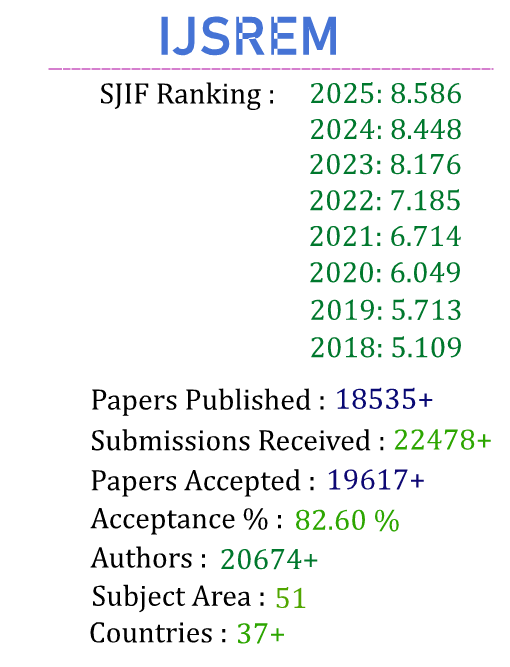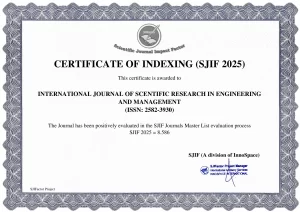 |
 |
 |
 |
| Further More |
| Guidelines |
| Call for Papers |
| Terms and Conditions |
| Publication Ethics |
| Privacy Policy |
| Academic Conferences |
| NCFT - 2025 |
| ICITES - 2025 |
| SPEJSS - 2025 |
| May - 2K25 |
| April - 2K25 |
| Contact Us |
 |
 |
 |
 |
 |
| Further More |
| Guidelines |
| Call for Papers |
| Terms and Conditions |
| Publication Ethics |
| Privacy Policy |
| Academic Conferences |
| NCFT - 2025 |
| ICITES - 2025 |
| SPEJSS - 2025 |
| May - 2K25 |
| April - 2K25 |
| Contact Us |
 |
International Journal of Scientific Research in Engineering and Management, Welcomes research papers, case studies, survey papers, academic project works, scholarly articles, academic articles, original or extended version of previously published papers in conferences, scholarly journals, and basic advances in the fields of Engineering, Science, and Management.
IJSREM provides an open access forum for scientists, scholars, researchers and engineers to exchange their research work, technical notes & surveying results among professionals throughout the world in e-journals publications.
Papers reporting original research or extended versions of already published conference/journal papers are all welcomed. Papers for publication are selected through peer review to ensure originality, relevance, and readability.
IJSREM ensures a wide indexing policy to make published papers highly visible to the scientific community. IJSREM is part of the eco-friendly community and favors e-publication mode for being an online ‘GREEN journal’.
All papers submitted to the Journal will be blind peer-reviewed. Only original articles will be published. The papers for publication in The International Journal of Scientific Research in Engineering and Management are selected through rigorous peer reviews to ensure originality, timeliness, relevance, and readability. All research articles submitted to International Journal of Scientific Research in Engineering and Management should be original in nature, never previously published in any journal or presented in a conference or undergoing such process across the globe.
 “IJSREM” is steered by a distinguished Board of Editors and is supported by an international review board consisting of prominent individuals representing many well-known universities, colleges, and corporations in the United States, Australia, Canada, Japan, China, India and many more.
“IJSREM” is steered by a distinguished Board of Editors and is supported by an international review board consisting of prominent individuals representing many well-known universities, colleges, and corporations in the United States, Australia, Canada, Japan, China, India and many more.
Papers for the regular issues of the journal can be submitted, round the year, electronically at editor@ijsrem.com After the final acceptance of the paper, based upon the detailed& review process, the paper will immediately be published online. However, assignment of the paper to a specific Volume / Issue of the Journal will be taken up by the Editorial Board & and the author will be intimated accordingly. For Theme Based Special Issues, time bound Special Call for Papers will be announced and the same will be applicable for that specific issue only.
Note: Our journal follows all the UGC Care recommended Guidelines

Mon – Sat: 9:00 AM – 6:00 PM
Sunday: 9:00 AM – 1:00 PM
International Journal of Scientific Research in Engineering and Management (IJSREM)
📍 #62/1, New No 7, 1st Cross, 2nd Main,
Ganganagar, R T Nagar, Bangalore North,
Bangalore, Karnataka, India – 560032